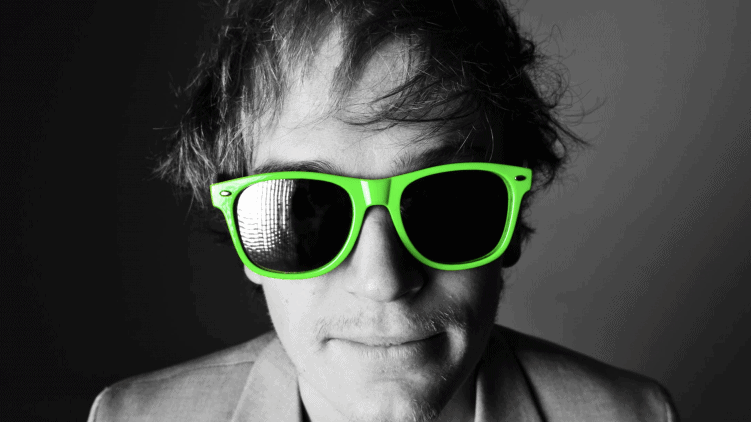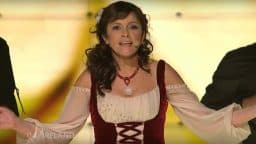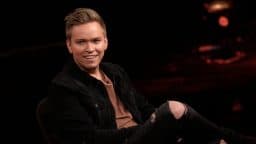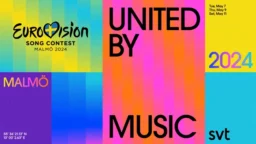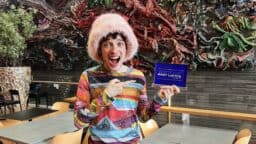What is a teenage punk rock band looking for at the Eurovision Song Contest? How do you live in Andorra when you can’t go out on the street without being recognized? And what is it like to be on stage with your best friends? Eurostory spoke with Niki Francesca (31), lead singer of the band Anonymous, the best Andorran Eurovision entry of all times. ‘Now I am grateful. Back then I was ecstatic.’
Niki, I’m interviewing you via Skype. Normally you travel a lot. Where are you right now?
In Andorra. That’s where my home is, but I’m always with one foot outside the door. I’m traveling all the time – you just have to, when you live in such a small country. The fear of getting locked in is always there.
Your Eurovision story actually starts quite suddenly. Can you take us back?
Me and three friends played in a punk rock band, Anonymous. We were teens, somewhere between sixteen and eighteen years old. Anonymous was already known in the underground scene of Andorra, and every now and then we performed in Barcelona and Madrid. One day in 2007 Andorran tv came to visit us for an interview. One of the journalists said: ‘Hey, we also do the Eurovision selection. Why don’t you compete?’ Yes, why not? The first punk rock band at the Eurovision Song Contest, how cool would that be?
And then?
We had to come up with a proper song. We already had a melody, but that was all, actually. That’s how we normally made music: most of our ‘songs’ didn’t contain actual lyrics, most of the times I just made up words while playing. But now we really wanted to tell a story. Perhaps a little premature, but I came up with the subject of climate change. That’s how we made Salvem el món (‘Save the world’). Not a typical Eurovision song, but that has never been our intention.
So you submitted the song. Did you expect anything from it?
Not the least. A short time before the results were announced, our parents received a phone call for the broadcasting company. Yes, our parents, not us, we were at school. They said we reached the final round and selection for Eurovision was a possibility. How bizarre! We agreed upon being together with all four of us when they would call with the final results. But the phone call came a lot earlier, I was still in bed! I remember thinking: no, I want us to be together! But notpicking up the phone also wasn’t an option, of course. So that’s when I heard: you are going to the Eurovision Song Contest. We came together, we looked at each other and said: what is happening? They had to be joking! All those artists and songs, professional jury members, the whole circus around it – and at the end, we got selected!
One of you guys actually was too young to perform at Eurovision at all.
Yes, Christian, our bass guitarist. He was only sixteen years old, so Eurovision rules didn’t allow him to be on stage. He couldn’t even come to Helsinki. That was such a shame. Everything we did in the weeks before Eurovision, we did together with all four members, just as Anonymous was supposed to be: at the promotion activities in Andorra and Spain, when recording the song and the video – until we finally departed for Helsinki.
Salvem el món was an atypical Eurovision song, but also an atypical Andorran entry: a group of teenagers, a punk rock song with half English, half Catalan lyrics. In all the other years Andorra participated, it always sent a female solo artist, and before you competed no Andorran entry sang one word in English. What was the impact in your country?
The impact was massive. Until then our audience mostly consisted of younger people. But when we were declared the Eurovision entry, the rest of Andorra was added to that fan base. Singing a song half in English felt completely natural. Of course, Catalan is our national language, and the Andorran rule is that most of your song must be in Catalan. But we were far more internationally based, all of our idols were American punk rock bands. No one in Andorra didn’t understand the choice for English lyrics, we actually got a lot of support. It was our way to connect our country to the rest of the world.
How did it feel to be part of such a strong community?
Mixed feelings, to be honest. Of course it was a great experience, but it also had its downside. Andorra is so small, everybody knows each other, so I couldn’t just walk across the street anymore without being pointed at, being photographed, that sort of stuff. That’s actually quite a cool experience when you’re with the whole band, but not when you’re alone. If you ask me: would you ever return to those days, I’d say: no, thank you.
How is that nowadays?
Thank God it lasted for no longer than three, four years. That’s when I decided to shave my head, and from that moment on nobody recognized me anymore –not even my parents. Sometimes someone still looks at me and says: ‘Hey, don’t I know you… aren’t you that famous Olympic skier?’ [laughs] Sure, I’m an Olympic skier, for Andorra. When I explain it, they suddenly remember. But luckily that’s all, most of the time I can walk across Andorra in peace now.
Those Eurovision days, the three minutes on stage… how do you reflect?
Right now I wouldn’t be able to experience the song contest the way I did back then. Now I am grateful, back then I was just completely ecstatic. I was eighteen, and at that age your personality hasn’t fully developed. You’re inconstant. At that moment, I didn’t feel the weight of it all, being part of Eurovision. Most of the time I was just thinking: ‘Yes, this is everything I wanted: living the punk rock band life, playing for large crowds, just like blink-182 or Sum 41. And we’ve made it!’ Now that ecstatic feeling is gone, but I know this unbelievable experience will stay with me for the rest of my life.
Looking at your Eurovision performance, I don’t see completely nerve-wrecked artists. I just see a bunch of guys having fun.
You nailed it! It was exactly the way you describe it. Just some best friends on stage, just rocking Europe. What a joke, what an amazing moment! We just had loads of fun.
But still your song had a message, and not a fun one: we mistreat the earth, and we can’t ignore the fact that our time is ending – unless we make a change right now. Do you think that message came through?
I hope so. We really meant it. In fact, that’s why, after our song ended, I didn’t shout ‘Thank you Europe’ of something like that, but: ‘We can still save the planet!’ I can only hope at least one of those millions of viewers heard that message. It’s inspiring to see this topic being widely discussed nowadays, by young people like Greta Thunberg, for example. I myself am old now. [laughs] Well, older, that is.
The 2007 song contest probably had the hardest semifinal in Eurovision history: for the last time there was online one semifinal round, and not more that 10 out of 28 countries could make it to the grand finale. It was hard to stand out during that endlessly long show. Still, you finished 12th, and almost made it. It’s the best achievement in Andorran Eurovision history. Do you see it that way too?
Sure! But still it’s a shame. We were so close! After the show some crew members came to us and told us: you should have waited one more year, next year there will me two semifinals, and you definitely would have come through then. Well, what can you do…
After Eurovision you were quite popular in and around Andorra. Still, pretty soon after that, Anonymous broke up. How come?
After Eurovision we were confronted with difficult stuff you have to deal with as a band: PR activities, contracts, future plans, and most of all: negotiating about it. All those things seemed mostly to rely on me, and I felt a growing aversion towards it. So after some time I decided to get the boys together, and I said: I think we can all agree about what’s the most important part of Anonymous, and that is our friendship. Let’s keep that friendship, and put the rest on standby. Now I have my own studio, I make my own music, share it with the world in a way that suits me, and I don’t have to do what others want me to do. Now I have the freedom I was looking for.
Can you tell us more about that freedom?
After Eurovision we were all studying in Barcelona. I got to play in new bands and projects. That’s how life goes: you grow, you learn. First it’s all just punk rock, but then you start listening closer to classical music, jazz, and you realize: hey, there’s some good stuff in there! That’s how I also got into electronic music. Eventually I went to the USA for a master’s degree in music production. I found out what it’s like to be independent as a musician. When you do the recording and producing by yourself, you’re able to search for your sound in much more detail. The software lets you work perfectly on your own, and it has become much easier to mix different sounds and influences. It’s all about those influences. When you’re a young artist, you just want to become like your idols. But there comes a time when you don’t want to be like someone else anymore, but like yourself. And in Nick Gain I found that ‘self’.
How did you come up with the idea for your first EP, Born in the 80’s?
You and I, I guess we have about the same age. We’re the cool guys from the eighties [laughs]. I feel it all the time, and that’s what I wanted to make an EP about. I wanted that identity to become words, music. For example: I don’t feel the need to follow everything on social media, like many younger people I know. That’s the subject of one of the songs, I don’t want to spend my 20’s on a screen. And the song Lost Generation is a message for people my age in Andorra or Spain: we all studied, we all have bachelor’s and master’s degrees, often graduated abroad. But then you come home and you realize there’s no job for you. I ended up well, but that’s not the story of most of my generation. Actually, you can see Born in the 80’s as a way to criticize our society – but in a cool way.
Is punk rock completely out of your life?
Not at all. I will always pay tribute to that genre, especially Californian punk rock from the beginning of this century. But when I write music, I want to express my feelings, and right now electronic music is the best genre for that purpose. But guitar music will never be out of my life. In fact, Gallego, the drummer of Anonymous, had been in Australia for a while, but recently he returned to Andorra. I presume we will develop some musical plans together. He mostly kept playing punk rock music, so now is the time to bring together our different styles.
Looking back, what would you say is the most important thing Eurovision brought you?
Eurovision gave me friends for life. It gave me wisdom, too, and experience. So yeah, you could say Eurovision made me a better person [laughs]. Would I participate again? I don’t know. It is a good thing it happened to me then, instead of now. Back then I was able to throw myself into the experience, completely unprepared. Now I would be much too nervous and concerned.
Do you still watch the song contest?
Of course! And I can see how much it has grown since our participation. That’s a good thing. Eurovision is not just Europe anymore, it’s the whole world. It connects people, and I think that’s so important in these times; the more you connect, the more you realize we’re so much alike.
But Andorra doesn’t participate anymore. Two years after your entry, the Andorran broadcasting company decided to quit. How do you feel about that?
Eventually it all comes down to money. And I can understand it’s quite an investment to compete in Eurovision, especially for such a small country as Andorra. The broadcasting company is completely state owned, and they decided to focus on other priorities. Sports, for example: leading competitions and tournaments like the Tour de France came this way. Of course I would love Andorra to return at Eurovision, and I’m sure one day it will become reality. It’s just a matter of time.
